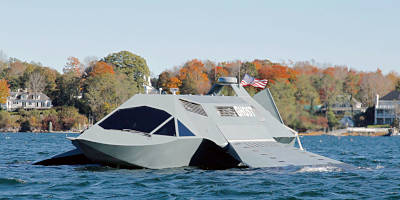WASHINGTON, June 17, 2012 — A hundred and fifty years after Confederate Army Maj. Gen. Thomas J. “Stonewall” Jackson’s Valley Campaign, a renowned Civil War historian spoke about it at the Pentagon, describing how a great success can boost a military leader’s reputation to the point that it has a major impact on his future operations.
Robert K. Krick delivered a presentation June 15, titled “Stonewall Jackson’s Rise to Prominence and the Shenandoah Valley Campaign,” as part of a speaker series sponsored by the Historical Office within the Office of the Secretary of Defense. Krick spent four decades as a National Park Service historian and retired as the chief historian at the Fredericksburg and Spotsylvania National Military Park in Virginia. He is the author of 20 books and more than 200 articles on the American Civil War.
During the Valley Campaign, which lasted from late March until early June 1862, Jackson used speed and bold tactics that enabled him to successfully engage much more numerous Union forces and prevent them from reinforcing an offensive against the Confederate capital of Richmond, Va. Jackson drove his 17,000 men to march 646 miles in 48 days in Virginia’s Shenandoah Valley, defeating Union Armies totaling more than 52,000 men in several battles.
The general’s success in the Valley Campaign created an “unbelievable metamorphosis” in his public image, according to Krick. Though Jackson had earned his nickname of “Stonewall” for standing firm at the First Battle of Bull Run on July 21, 1861, Krick said that before the Valley Campaign he was known primarily for being “odd” and “eccentric.” In fact, some of his subordinates held him in such low esteem in early 1862 that they jointly wrote a letter complaining about him to the secretary of war and the president himself.
At the beginning of the Valley Campaign, Jackson’s soldiers were “decidedly uncertain” about his abilities, and some were actually scornful of him, Krick said. The historian described the general as a dour man who held a “generally stern worldview.” He was partly deaf, very secretive and had almost no sense of humor. Before the war, he had been a relative failure as a professor of natural philosophy and instructor of artillery at the Virginia Military Institute. Students complained about him, asked for his removal and called him “Tom Fool.”
Everything changed for Jackson in that spring of 1862. “By the time the Valley campaign was over, everyone recognized Jackson’s genius,” Krick said.
Jackson’s success in the campaign was sorely needed good news for the Confederacy, Krick said, and it made the general one of the most famous and adored southern military leaders. His new status as a genius boosted the morale of southern troops, who thought he could help lead them to victory, and it demoralized Union forces, who had come to believe he was such a formidable opponent that it would be very difficult to defeat him. This attitude very likely helped Jackson in subsequent military engagements, according to the historian.
“People succeed far more often when they think they will succeed,” Krick said. “And they fail far more often when they think they will fail.”
The historian noted that Jackson was an old-fashioned, devotedly religious man. He believed in predestination and thought he was “God’s instrument on earth” during the conflict. Even when failed terribly during the Seven Days Battles around Richmond from June 25 to July 1 1862, the general’s faith in himself did not waver, and neither did Confederate soldiers’ faith in his abilities as a commander.
“Jackson’s greatest talent on the battlefield was that he had his jaw clenched more tightly than anyone else on either side,” Krick said. “He stuck to it.”
In an interview with the American Force Press Service conducted after the presentation, Krick reinforced the notion of Jackson’s determination as his biggest asset.
“When things got chaotic and foggy and messy, he was more determined than anyone,” Krick said. “That really was his number one characteristic.”
Krick noted during the interview that Jackson is among the dozen or so most famous American military commanders of all time, despite lacking “that unbelievable capacity to determine what the enemy might to do and make the perfect counterpoint” that Frederick the Great and many other great commanders seemed to have.
“Jackson had very few resources in the valley. All he had was a small army and a lot of determination and will power, and he built that into something more than it was, which then gave him the opportunity on broader fields to do the same thing again,” Krick said. “I imagine that’s a universal … human equation. Since the first people started slinging javelins at one another, determination and dedication have been an important feature.”
During the interview, Krick said that those qualities would also serve today’s battlefield commanders.
“It’s hard to imagine there will ever be a human period of stress, turmoil and danger in which iron will, determination, dedication and willingness to stick to it do not succeed in some degree and then persuade the people who have to help you that you can succeed further,” he said.
Jackson achieved the rank of lieutenant general in the Confederate Army. He died on May 10, 1863, eight days after being mistakenly shot by Confederate troops during the Battle of Chancellorsville.
Source:
U.S. Department of Defense
Office of the Assistant Secretary of Defense (Public Affairs)

 von
von 
